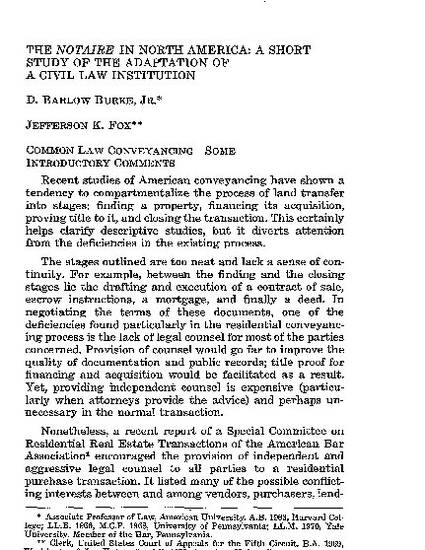
Article
The Notaire in North America: A Short Study of the Adaptation of a Civil Law Institution
Tul. L. Rev.
(1976)
Abstract
Recent studies of American conveyancing have shown a tendency to compartmentalize the process of land transfer into stages: finding a property, financing its acquisition, proving title to it, and closing the transaction. This certainly helps clarify descriptive studies, but it diverts attention from the deficiencies in the existing process. The stages outlined are too neat and lack a sense of continuity. For example, between the finding and the closing stages lie the drafting and execution of a contract of sale, escrow instructions, a mortgage, and finally a deed. In negotiating the terms of these documents, one of the deficiencies found particularly in the residential conveyancing process is the lack of legal counsel for most of the parties concerned. Provision of counsel would go far to improve the quality of documentation and public records; title proof for financing and acquisition would be facilitated as a result. Yet, providing independent counsel is expensive (particularly when attorneys provide the advice) and perhaps unnecessary in the normal transaction.
Keywords
- Conveyance,
- Real Property,
- Acquisition,
- Title,
- Land Transfer,
- Escrow,
- Mortgage,
- Deed
Disciplines
Publication Date
1976
Citation Information
Barlow F. Burke. "The Notaire in North America: A Short Study of the Adaptation of a Civil Law Institution" Tul. L. Rev. Vol. 50 (1976) p. 318 ISSN: 0041-3992 Available at: http://works.bepress.com/barlow_burke/16/
